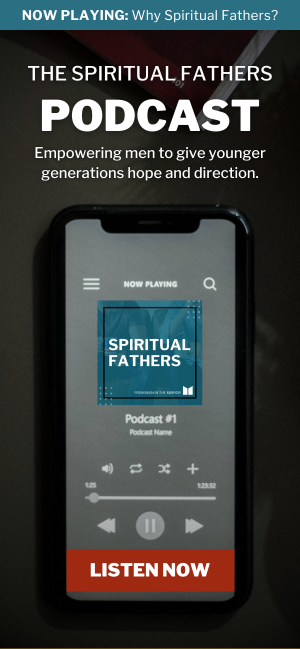Staying Clean in a Dirty World
Some men in the church get swept up with the false teachings and empty promises of culture, while others cleanse themselves to be set apart for a purpose. In Paul’s letter to Timothy, we see three things we need to do to stay clean in a dirty world.

By Jeremy Schurke
Director of Mirror Labs
Casselberry, Florida
In a wealthy Roman home, they had two types of vessels. Some were made of gold and silver, and those were reserved for special occasions, such as a celebration or serving a meal to a guest of honor. The concept is similar to how we reserve “fine china” today, something our parents’ generation keeps trying to pass down to us and we keep trying to avoid! But in the same way, it was set apart for special purposes.
Then the wooden and clay vessels were used for everyday purposes, such as low-key meals or even taking trash or excrement out of the home. These vessels were often breakable and easily replaceable.
Paul sets up a metaphor for Timothy involving both types of vessels:
Now in a great house, there are not only vessels of gold and silver but also of wood and clay, some for honorable use, some for dishonorable. (2 Timothy 2:20)
He then gets straight to his meaning with the word “therefore”—
Therefore, if anyone cleanses himself from what is dishonorable, he will be a vessel for honorable use, set apart as holy, useful to the master of the house, ready for every good work. (verse 21)
Paul doesn’t just prompt Timothy to consider which vessel he and those he’s discipling are. He’s making the case that we have the ability and responsibility to cleanse ourselves—and thereby change our usage.
Paul makes the case that we have the ability and responsibility to cleanse ourselves—and thereby change our usage.Click To TweetBiblical scholars and commentators take different approaches to the meaning of the “great house” in the passage. I share the view that Paul is referring to the church—you and me. As the master of the house, God wants us to be the kind of men who are prepared to be used by Him for every good work.
Last weekend, my son had a birthday party at our house. How awkward would it have been if, once all our friends and family arrived, I said, “Welcome, glad to see you! Okay, take a seat, everyone. I’m going to go wash dishes for a half hour so that we have clean plates and forks to eat cake with. Sit tight.” That wouldn’t have worked out. As the master of the house, I need clean vessels prepared for every moment.
If we want to be vessels who are prepared for honorable use, we need to cleanse ourselves from what is dishonorable. Now, what is dishonorable? If you’ve been following along with this blog series or with our video Bible study, you’ll see that Paul is writing to Timothy in 2 Timothy about the false teaching that was prevalent at that time.
Likewise, we can get caught up in the false teachings and empty promises our culture offers us. We get stained; we get dirtied. And before long, we find ourselves looking more like vessels of wood and clay than gold and silver.
So how do we cleanse ourselves?
Step 1: Know When to Flee
Paul doesn’t leave Timothy to guess at how to cleanse himself from what is dishonorable. He gives this prescription:
So flee youthful passions and pursue righteousness, faith, love, and peace, along with those who call on the Lord from a pure heart. (verse 22, emphasis added)
“Flee” is an interesting word choice in verse 22. The Greek word used is pheugō, meaning to flee away or seek safety by flight. It’s also where we get the word “fugitive.”
We can get caught up in the false teachings and empty promises our culture offers us, and before long, we find ourselves looking more like vessels of wood and clay than gold and silver.Click To TweetWhen I think about a fugitive, I imagine a criminal running from the authorities. He doesn’t taunt them, hesitate, or let them catch up. No, he’s doing everything he possibly can to get away from what he knows has the power to own and imprison him.
That’s how Paul advises Timothy to respond to youthful passions, or “evil desires of youth” as the NIV translation puts it. He wants him to flee from the danger that, to Paul, is obvious and imminent.
Although he doesn’t specifically name the youthful passions, there are many possibilities. Some that come instantly to my mind are those my peers and I—men in our 30s—struggle with:
- sexual distortions, such as unchecked lust or pornography use
- chronic impatience born from a high-speed world, impacting our marriages, parenting, and friendships
- contentiousness or a love of debate that’s devoid of grace or understanding
- a love of novelty that drives us to always chase after the new, shiny thing
- self-centeredness that keeps us more focused on ourselves than others
Your vices might be completely different from these ones, but in order to flee, you first have to identify what you’re running from.
The reality is the passions of our youth don’t exist just in our youth. They start there, but they follow us as we age, and often, they grow and evolve.
Several years ago, I had a dream in which I was out walking and came upon a large cave. Seeing something reflecting light, I walked inside. In the wall there was a clear, shining diamond. As my eyes adjusted to the darkness, I noticed an even bigger diamond lighting up the cave farther down.
I started to get more excited as I explored. Jewels sparkled through the walls. Diamonds and rubies were everywhere! But I noticed it was getting smaller and smaller the deeper I went into the cave.
Suddenly, the wall moved. It was slight, but enough to scare me awake. I couldn’t shake the vividness of the dream, and when I finally fell back asleep, I slipped right back in.
I remember that, in spite of my apprehension, I kept walking. I’m going to be rich. This is unbelievable! The jewels were bigger with every step, drawing me deeper inside.
And then I realized—too late—that I was stuck. I couldn’t turn around. At that moment, the whole cave began to move, and horrified, I understood at once that I was inside of a giant snake.
I couldn’t breathe as it constricted me. I knew I was dying, and I was terrified. I’d fallen for the snake’s trick.
With one last desperate attempt, I said, “Jesus!” My arm freed up, and there was a dagger in my hand. Just like that, I cut through the belly of the snake, gulped down air, pulled myself out, and woke up shaking in a cold sweat.
We shouldn’t waste any time on our vices. They may look like sparkling treasures, but they’re Fool’s Gold that leads us deeper and deeper until we’re trapped and spiritually dying. Don’t entertain or endure them. Don’t rationalize them or make excuses. Just flee.
Step 2: Know What to Chase
We need to know when to flee, but that alone isn’t enough. We have to know what to chase after. “Pursue righteousness, faith, love, and peace” (verse 22b).
Our vices may look like sparkling treasures in a cave, but they're Fool's Gold that leads us deeper and deeper until we’re trapped.Click To TweetThe goal isn’t to kill our passion and desire; it’s to control and redirect them to the source of true life and goodness so that they can be for honorable use.
We don’t want dead men walking around as the church. God made us beings of desire and passion. The goal is not to kill desire, but to kill sin and stoke holy desire—to replace our vices with virtue.
The Greek word Paul used for “pursue,” means to hunt down. It’s the same word that Paul used elsewhere when he described how he hunted down Christians with zeal to kill them.
Paul is highlighting for Timothy the intensity of both fleeing sin like a fugitive and chasing after holy pursuits with zeal.
How do you pursue righteousness? It’s never enough to just avoid evil. We must intentionally, consistently seek to do what is good.
How do we pursue faith? Our lives reflect the consequences of having faith. For example, what kind of decisions would you make today if you knew God’s promises were actually true? If you knew you could fully trust Him?
How do we pursue love? As we absorb into our hearts and minds the truth that we are loved by the Father through Christ in the Spirit, we can actively love saints and love sinners in all their glory and in all their faults.
The goal isn’t to kill our passion and desire. We don't want dead men walking around in the church. Click To TweetHow do we pursue peace? If you’ve ever used “shalom” as a greeting, you know it means peace. But the peace embodied by “shalom” in the New Testament is far more than just the absence of pain and violence. It’s also the presence of God’s blessing and the wholeness of life and reconciliation only God can offer through Christ.
If you want to experience more peace, pursue more of God’s presence. Out of that will also flow righteousness, faith, and love.
Step 3: Know Whom to Run With
In my house, we set apart our clean dishes from our dirty ones. I’m sure you do, too. You set them apart because you want the clean ones to remain clean.
Likewise, Paul says in this passage that we are to be set apart as holy. And we need one another to stay clean.
What’s the point of vessels? Are they just supposed to be filled up so they can hold things? No. In a house, they feed, pour out, and provide. They have purpose. If they are for honorable use, they pour out honorable things. Let’s be men who pour out and feed others.
If you want to experience more peace, pursue more of God's presence.Click To TweetThe adventure of faith is not a journey to be traveled alone. It’s a communal pursuit.
Paul writes that Timothy should pursue these things “along with those who call on the Lord from a pure heart” (verse 22c)
Recently, what has the Christian life looked like for you? A group hike, a road trip with a close friend, or a solo journey? Who do you have around you with a pure heart, devoted to God, to go “along with”?
Paul’s metaphor for Timothy makes me think about those in my own life with pure hearts; these are the guys I rely on when I’m walking through fire. If a wooden vessel burns, it disappears, turning to ashes. When a clay vessel burns, it shrinks back and hardens. But what happens to pure gold or silver when it burns? It refines. It purifies.
When life gets hard and answers don’t come easy, who do you have walking through the fire with you? If a few men don’t come to mind right away, spend some time today praying about what relationships in your life you need to build or deepen.
Run from sin, run to God, and run with other believers.Click To TweetIf you aren’t sure where to begin, get connected in a small group at a local church. Ask a Christian neighbor or coworker to lunch this week. And if you aren’t sure which vessel you are right now, ask an older, more experienced Christian man to take you under his wing and guide you as you cleanse yourself for honorable use, with God’s help.
THE BIG IDEA: Run from sin, run to God, and run with other believers.
No matter what it takes, find those who are honorable vessels with hearts of gold, and together encourage one another to flee from evil desires and chase after the goodness of God. Pursue these friendships like your life depends on it—because it does.
Together, let’s be vessels that God can use for honorable purposes to build His kingdom.
♦♦♦







